
How to Deal with Angry Family Members
Dealing with angry family members can be tough. When tempers flare and emotions run high, it can feel like walking on eggshells.
But you don’t have to worry!
There are ways to maintain harmony and deal with the members suffering from anger issues. Today, we are helping you explore how to deal with angry family members.
First and foremost, it’s essential to remember that anger is a natural emotion. We all feel it occasionally, and our loved ones are no exception. Conflicts can arise unexpectedly, whether it’s a disagreement over chores, finances, or differing opinions.
Understanding the root cause of the anger is critical. Does it stem from a specific incident, pent-up frustration, or external stressors? Taking a moment to assess the situation can help you respond more effectively.
Communication is crucial in diffusing tense situations. Instead of escalating the argument, listen actively to what your family member says. Validate their feelings and show empathy, even if you disagree with their perspective.
Setting boundaries is essential for maintaining healthy relationships. If a family member’s anger becomes abusive or toxic, it’s okay to step away and seek support from other family members or friends.
Lastly, patience and forgiveness are essential in dealing with angry family members. Remember that conflicts are a natural part of family dynamics, and working through them together can strengthen your bond in the long run.
In this blog, we’ll explore these strategies further and provide practical tips on how to effectively deal with angry family members. So, let’s embark on this journey together to foster peace and understanding within our families.
What Causes Anger in a Family Member?
Anger in a family member can stem from various underlying factors, often rooted in feelings of injustice, personal attack, inadequacy, loss of control, or vulnerability.
- Feeling like something’s unfair: Perceiving a situation as unjust or unequal can trigger anger. Whether it’s unequal treatment, distribution of resources, or decision-making, a sense of unfairness can ignite frustration and resentment.
- Feeling like someone’s attacking you personally or physically: Personal attacks, whether verbal or physical, can evoke intense anger. Criticism, insults, or feeling threatened can lead to a defensive response, resulting in heightened emotions.
- Feeling like you’re not good enough or in control: Inadequacy and loss of control are common triggers for anger. When individuals feel incapable or powerless, they may respond with frustration and anger to regain a sense of competence or authority.
- Feeling like you can easily get hurt: Vulnerability can provoke defensive reactions, including anger, as a means of self-protection. Fear of emotional or physical harm, rejection, or betrayal can lead individuals to respond aggressively to perceived threats.
Understanding the underlying causes of family members’ anger is essential for effectively addressing conflicts and fostering healthier communication and relationships within the family unit.
By identifying and addressing these root triggers, family members can work towards resolving conflicts constructively and building stronger connections based on empathy, understanding, and mutual respect.
8 Tips to Deal with Angry Family Members
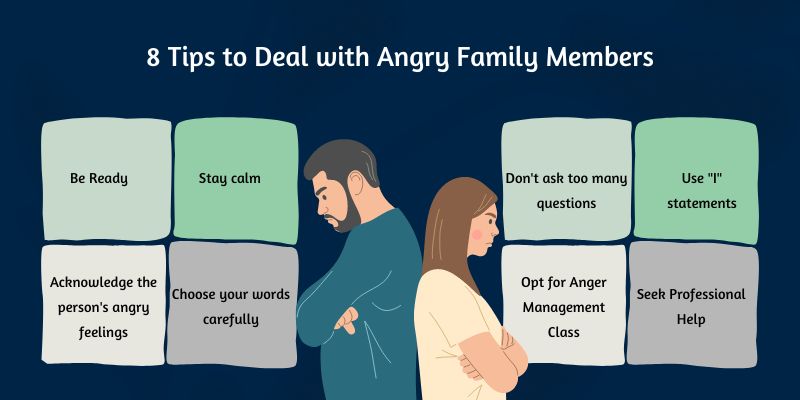
Dealing with angry family members can be challenging, but conflicts can be resolved effectively with the right approach. Here are eight tips to help navigate these situations smoothly:
Let’s explore each of these tips in detail so you can understand how to implement them to control anger effectively.
1. Be Ready
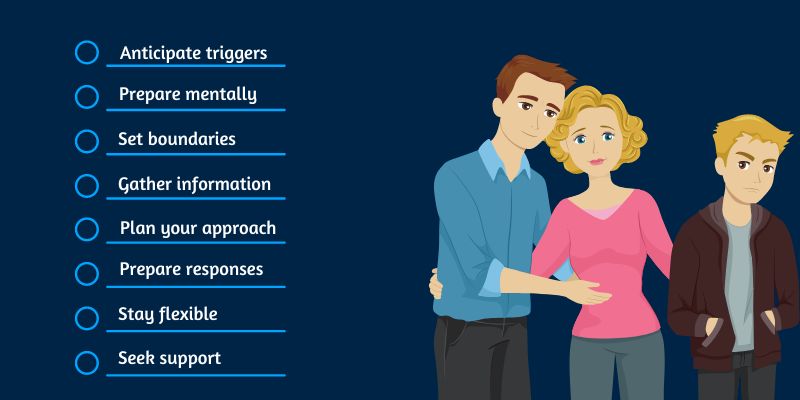
Being prepared is essential when dealing with angry family members. You can approach the situation more effectively by anticipating potential conflicts and having a plan. Here are some strategies to help you be ready:
- Anticipate triggers: Identify common triggers or situations that may provoke anger in your family member. This could include topics of discussion, past conflicts, or stressful environments.
- Prepare mentally: Take time to mentally prepare yourself before interacting with an angry family member. Remind yourself to stay calm, patient, and empathetic throughout the conversation.
- Set boundaries: Establish clear boundaries for acceptable behavior during the interaction. Communicate these boundaries calmly and assertively to ensure mutual respect and understanding.
- Gather information: Gather relevant information or facts related to the situation before addressing the issue with your family member. Having accurate information can help clarify misunderstandings and facilitate productive discussions.
- Plan your approach: Consider the best approach for addressing the issue with your family member. Choose a time and place conducive to open communication and minimize distractions or interruptions.
- Prepare responses: Anticipate potential responses or reactions from the angry family member and prepare your responses accordingly. Stay focused on addressing the issue and avoid getting sidetracked by emotions or personal attacks.
- Stay flexible: While it’s essential to be prepared, remain flexible in your approach and be open to adapting your strategies based on the situation’s dynamics. Flexibility can help you navigate unexpected challenges and find constructive solutions.
- Seek support: If you anticipate a challenging interaction with an angry family member, don’t hesitate to seek support from other family members, friends, or a trusted mediator. Having support can provide you with reassurance and guidance throughout the process.
2. Stay Calm and Don’t Judge

Maintaining your composure and refraining from passing judgment are essential when dealing with angry family members. Here are some strategies to help you implement this tip effectively:
- Practice deep breathing: When faced with an angry family member, take deep breaths to help calm your nerves and regulate your emotions. Deep breathing can help you stay grounded and composed during the interaction.
- Focus on empathy: Understand the underlying emotions driving your family member’s anger. Put yourself in their shoes and empathize with their perspective, even if you disagree. Showing empathy can defuse tension and foster a sense of understanding.
- Listen actively: Listen closely to what your family member is saying without interrupting or dismissing their feelings. Practice active listening by nodding, maintaining eye contact, and paraphrasing their words to demonstrate understanding.
- Avoid reacting impulsively: Refrain from reacting impulsively to your family member’s anger, as this can escalate the situation further. Instead, respond calmly and thoughtfully, choosing your words carefully to promote constructive dialogue.
- Suspend judgment: Resist the urge to pass judgment or criticize your family member’s emotions, even if you disagree with their behavior. Judgmental responses can exacerbate tensions and hinder productive communication.
- Focus on solutions: Shift the focus of the conversation towards finding solutions rather than dwelling on blame or fault-finding. Collaborate with your family members to identify mutually beneficial outcomes and work towards resolving the issue together.
- Take breaks if needed: If the interaction becomes too heated or overwhelming, don’t hesitate to take a break and revisit the conversation later when emotions have cooled down. Stepping away temporarily can prevent further escalation and allow both parties to regroup.
- Seek support: If you find it challenging to stay calm and non-judgmental during the interaction, seek support from other family members, friends, or a professional mediator. Having additional support can provide you with guidance and perspective during difficult conversations.
3. Acknowledge the Person’s Angry Feelings
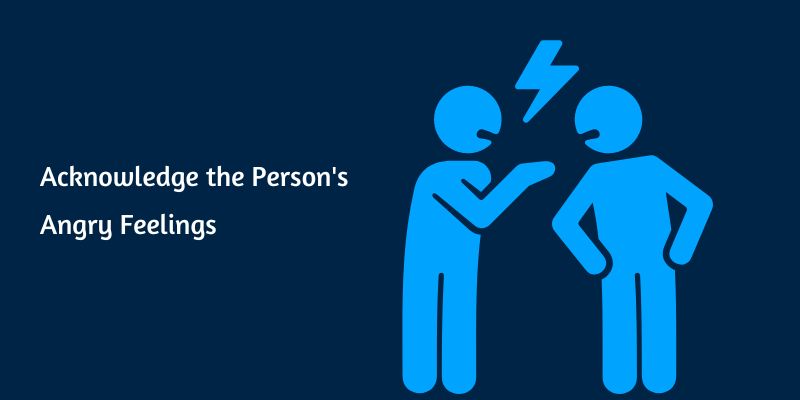
Acknowledging the emotions of an angry family member is crucial in fostering understanding and de-escalating conflicts. Here are strategies to effectively implement this tip:
- Validate their emotions: Let your family members know you recognize and understand their anger. Use empathetic statements such as “I can see that you’re upset” or “It sounds like you’re feeling angry.”
- Reflect on their words: Paraphrase their statements to show that you actively listen and validate their perspective. For example, you could say, “So what you’re saying is…” or “It seems like you’re feeling…”
- Express empathy: Demonstrate empathy by acknowledging the reasons behind their anger. Validate their experiences and emotions without judgment, even if you disagree with their viewpoint.
- Use non-verbal cues: Employ non-verbal cues such as nodding, maintaining eye contact, and using a calm tone to convey empathy and understanding.
- Avoid minimizing or dismissing their feelings: Refrain from downplaying or dismissing your family member’s anger, which can invalidate their emotions and escalate tensions. Instead, take their feelings seriously and show genuine concern.
- Show willingness to listen: Communicate your willingness to listen and understand their perspective by actively engaging in the conversation. Encourage them to express their feelings and concerns openly without fear of judgment.
- Focus on feelings, not facts: In the initial stages of the conversation, prioritize acknowledging and validating their emotions rather than debating facts or assigning blame. Addressing their feelings first can lay the foundation for constructive dialogue.
- Reassure them of your support: Offer reassurance that you can support them and work through the issue together. Let them know that you’re committed to resolving both parties’ needs and concerns.
4. Choose Your Words Carefully
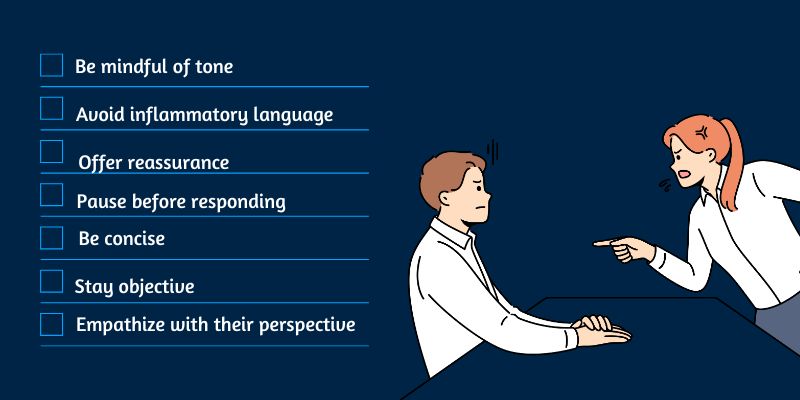
When dealing with angry family members, your words can escalate or diffuse the situation. Here’s how to navigate conversations effectively:
- Be mindful of tone: Maintain a calm and respectful tone of voice, even if tensions are high. Avoid sarcasm, condescension, or aggression, which can further provoke anger.
- Avoid inflammatory language: Refrain from using inflammatory or accusatory language that may exacerbate the conflict. Instead, focus on neutral and non-threatening terms to convey your message.
- Offer reassurance: Use words of reassurance to convey empathy and understanding. Assure your family members that you’re listening and committed to finding a resolution together.
- Empathize with their perspective: Acknowledge your family member’s feelings and validate their perspective, even if you disagree. Use empathetic phrases like “I understand why you’re upset” to demonstrate empathy.
- Stay objective: Keep the conversation focused on the issue and avoid bringing up past grievances or personal attacks. Stick to the facts and address specific behaviors or concerns rather than making sweeping generalizations.
- Be concise: Keep your messages clear and concise to avoid confusion or misinterpretation. Avoid rambling or going off-topic, as this can detract from the main issue and prolong the conflict.
- Pause before responding: Take a moment to pause and collect your thoughts before responding to your family member. This allows you to choose your words carefully and respond thoughtfully rather than reacting impulsively.
5. Don’t Ask Too Many Questions

When dealing with angry family members, asking too many questions can exacerbate the situation. Here’s why and how to navigate this:
- Avoid interrogation: Asking numerous questions can feel like interrogation, putting your family member on the defensive. Instead, aim for a balance between listening and sharing your perspective.
- Give space to express: Allow your family member to express their feelings without feeling interrogated. Encourage them to openly share their thoughts and emotions by creating a supportive and non-judgmental environment.
- Focus on active listening: Rather than peppering them with questions, focus on listening to what they say. Paraphrase their statements to show understanding and validate their feelings.
- Respect boundaries: When discussing sensitive topics, respect your family members’ boundaries and comfort level. Avoid pushing for answers if they seem uncomfortable or unwilling to share.
- Use open-ended questions sparingly: While open-ended questions can facilitate deeper conversations, use them sparingly when dealing with anger. Instead, focus on expressing empathy and understanding.
- Offer support and validation: Instead of probing questions, offer support and validation for their emotions. Let them know you’re there to listen and help in any way you can.
- Redirect the conversation: If you sense that asking questions escalates the situation, try redirecting the conversation to a more neutral topic. This can help diffuse tension and steer the interaction more positively.
- Be patient: Be patient and understanding if your family member hesitates to engage in dialogue. Respect their pace and allow them to express themselves at their own comfort level.
6. Use “I” Statements
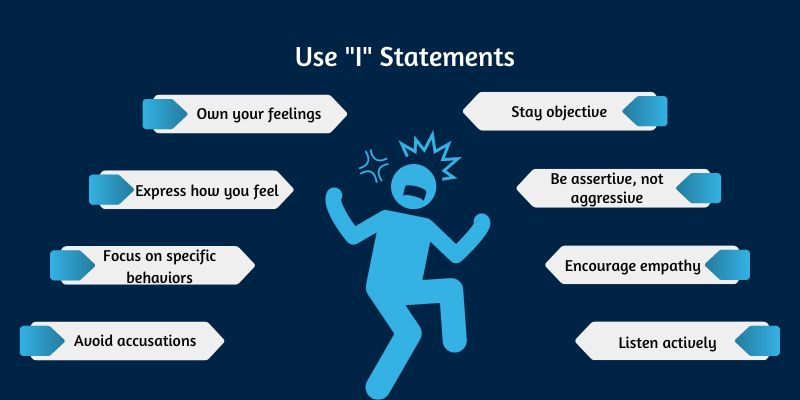
Using “I” statements is helpful when dealing with angry family members. It helps express your feelings and perspective without sounding accusatory or confrontational. Here’s how to effectively utilize this strategy:
- Own your feelings: Start your statements with “I” to take ownership of your emotions and experiences. This helps prevent the other person from feeling blamed or attacked.
- Express how you feel: Clearly state your emotions using “I” statements, such as “I feel frustrated when…” or “I’m hurt because…”. This allows you to communicate your feelings without blaming the other person.
- Focus on specific behaviors: Use “I” statements to address specific behaviors or actions causing distress. For example, say, “I feel disrespected when you interrupt me,” instead of, “You always interrupt me.”
- Avoid accusations: Refrain from using “you” statements that sound accusatory or critical. Instead, focus on expressing your thoughts and emotions to foster a more constructive conversation.
- Stay objective: Keep your statements focused on your experiences and avoid making assumptions about the other person’s intentions or motivations. Stick to the facts and how they impact you personally.
- Be assertive, not aggressive: Use “I” statements assertively to communicate your needs and boundaries, but avoid coming across as aggressive or confrontational. Maintain a respectful and calm tone throughout the conversation.
- Encourage empathy: Using “I” statements can help encourage empathy and understanding from the other person. By expressing your feelings and experiences, you invite them to see things from your perspective.
- Listen actively: After expressing your feelings with “I” statements, listen to the other person’s response. Create an open and supportive space for dialogue where both parties can express themselves without fear of judgment.
7. Opt for Anger Management Class
Enrolling in anger management classes offered by Mastering Anger can be a proactive and constructive way to address anger issues within a family dynamic. Here’s why and how it can be beneficial:
- Professional guidance: Anger management classes offered by Mastering Anger are led by trained professionals who can provide valuable insights and techniques for managing anger effectively. These experts can offer personalized support tailored to the individual’s needs.
- Learn coping strategies: Anger management classes teach practical coping strategies and techniques for regulating emotions healthily. Participants learn deep breathing, relaxation exercises, and cognitive restructuring skills to manage anger triggers more effectively.
- Identify triggers: Participants in anger management classes gain insight into their underlying causes and triggers. By understanding what provokes their anger, individuals can develop strategies to prevent or manage these triggers.
- Improve communication: Effective communication is a key component of anger management. Participants learn how to express their feelings assertively and constructively, reducing the likelihood of conflicts escalating within the family.
- Enhance self-awareness: Anger management classes promote self-awareness and emotional intelligence, empowering individuals to recognize and regulate emotions more effectively. This increased self-awareness can lead to healthier relationships and improved family dynamics.
- Break the cycle: Anger management classes provide tools and strategies to break the reactive and destructive behavior cycle. Participants learn alternative ways of responding to anger triggers, reducing the likelihood of repeating negative patterns within the family.
- Support for family members: Enrolling in anger management classes demonstrates a commitment to personal growth and self-improvement, which can reassure family members who may be affected by the individual’s anger. It shows a willingness to take responsibility for one’s actions and work towards positive change.
- Promote healing and reconciliation: By addressing anger issues proactively through anger management classes, individuals can work towards healing past conflicts and repairing damaged relationships within the family. This can lead to greater harmony, understanding, and resilience in the family unit.
8. Seek Professional Help

In some cases, dealing with angry family members may require professional intervention. Seeking help from a trained therapist or counselor can provide valuable support and guidance in navigating complex family dynamics and resolving conflicts.
Here’s why professional help can be beneficial:
- Expertise in conflict resolution: Therapists and counselors specialize in helping individuals and families navigate challenging situations, including managing anger and resolving conflicts. They can provide valuable insights and strategies for improving communication and fostering healthier relationships.
- Neutral third-party perspective: A professional therapist or counselor offers a neutral third-party perspective, free from biases or personal involvement in family issues. They can facilitate open and honest dialogue between family members and help mediate conflicts fairly and impartially.
- Individualized treatment: Professional therapists tailor their approach to meet each family’s unique needs and circumstances. They can assess underlying factors contributing to anger within the family and develop personalized treatment plans to address these issues effectively.
- Skill-building and education: Anger management classes or therapy sessions provide opportunities for family members to learn and practice effective coping skills, communication techniques, and conflict resolution strategies. These sessions can empower individuals with the tools they need to manage anger and improve relationships.
- Safe and confidential environment: Therapy sessions offer a safe and confidential environment where family members can express themselves openly without fear of judgment or reprisal. This confidentiality encourages honesty and vulnerability, fostering deeper understanding and connection among family members.
- Long-term support: Professional therapists provide ongoing support and guidance throughout resolving family conflicts and managing anger. They can offer encouragement, accountability, and follow-up care to ensure progress continues beyond the therapy sessions.
Seeking professional help demonstrates a commitment to addressing underlying issues and improving the family’s overall well-being.
Whether through individual therapy, family counseling, or anger management classes, professional intervention can be valuable in navigating challenges and fostering healthier relationships within the family unit.
Conclusion
Understanding how to deal with angry family members is undoubtedly challenging but not impossible.
By implementing the tips discussed in this blog, such as staying calm, using “I” statements, and seeking professional help, you can easily navigate conflicts and foster healthier relationships within your family.
Anger is a natural emotion, and conflicts are a normal part of family life. However, addressing and resolving these conflicts can make all the difference in maintaining harmony and mutual respect.
It’s essential to approach these situations with empathy, understanding, and a willingness to listen. Validate your family member’s feelings, express your emotions openly and respectfully, and work together to find constructive solutions.
Avoiding judgment, refraining from asking too many questions, and choosing your words carefully can help create a supportive environment conducive to effective communication and conflict resolution.
Furthermore, don’t hesitate to seek professional help if you cannot resolve conflicts alone. Therapists, counselors, and anger management classes can provide valuable guidance, support, and strategies for managing anger and improving family dynamics.
Ultimately, the goal is to cultivate a culture of respect, empathy, and open communication within your family.
By practicing patience, understanding, and forgiveness, you can effectively navigate conflicts and strengthen your bonds with your loved ones.
Addressing anger and conflicts within your family is a journey. You can create a more peaceful and harmonious family environment for everyone involved with perseverance and commitment.





Responses